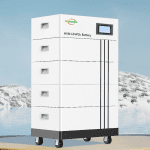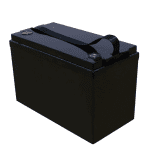The demand for energy storage batteries is increasing, and there are many different types of energy storage batteries on the market. The 100Ah LiFePO4 Powerwall is one of the types of batteries that many homeowners will consider when choosing. How is it different from other home batteries? We will delve into these differences in this article and compare them comprehensively to understand why the 100Ah LiFePO4 Powerwall is the best choice for modern homes.
Energy Density and Efficiency of 100Ah LiFePO4 Powerwall
Energy density and efficiency are key parameters for evaluating home batteries, and many businesses or homeowners will consider this when purchasing. The highlight of the 100Ah LiFePO4 Powerwall is its high energy density, which can store more energy in a smaller space. In terms of efficiency, their charge/discharge efficiency remains at 95%, which can well ensure that the least energy is lost in the process and reduce waste. In comparison, traditional home batteries or lead-acid batteries have an efficiency of about 70-80%. The efficiency of up to 95% also means that they have a faster charging time, which starkly contrasts with other home batteries.

Safety Features of the 100Ah LiFePO4 Powerwall
Safety is paramount to any energy storage battery user, and this is another advantage of the 100Ah LiFePO4 Powerwall. They are primarily composed of LiFePO4 batteries, which are inherently safer than other types of lithium-ion batteries due to their chemical stability. They are designed to withstand high temperatures without decomposing, reducing the risk of thermal runaway. Compared to other home batteries that are prone to producing harmful gases and leaks, the 100Ah LiFePO4 Powerwall is a safer choice, and its safety is further enhanced by non-toxic materials and rugged construction.
Longer Life
Their cycle life also sets the 100Ah LiFePO4 Powerwall apart from other home batteries. They offer 2,000 to 6,000 charge and discharge cycles at 80% depth of discharge. By comparison, other household batteries typically offer around 500 to 1,000 cycles. This extended cycle life means that LiFePO4 batteries have a service life of 10-15 years under typical home use. In addition, they maintain a more consistent voltage profile during discharge. This feature ensures that home appliances receive a stable voltage supply, which is especially beneficial for sensitive electronic devices

Integration and Versatility

Versatility and ease of integration were also considered when designing the 100Ah LiFePO4 Powerwall. Unlike other home batteries, it can seamlessly integrate with various renewable energy sources. This compatibility ensures that users can maximize the production and storage of renewable energy, increase energy independence, and reduce dependence on the grid. In addition, the design allows users to scale and expand their energy storage capacity as demand grows. This modularity allows users to add more batteries to the system without major modifications and makes installation easier.
Cost-effectiveness
100Ah LiFePO4 Powerwalls will cost more than other types of home batteries, but they last longer and are more efficient, resulting in lower overall costs over the battery’s life. Users can replace their energy storage system less frequently, saving on replacement and maintenance costs. Their efficiency also maximizes energy savings by reducing the amount of power drawn from the grid. In contrast, the shorter lifespan and lower efficiency of other home batteries, such as lead-acid batteries, mean higher long-term costs. Users need to replace these batteries more frequently, which are less efficient at storing and utilizing energy.
Best Choice for Home Energy Storage
The 100Ah LiFePO4 Powerwall has many advantages that set it apart from other home battery options. Its safety, efficiency, and longevity make it ideal for modern users. While the price may be higher, the long-term benefits and savings make it a worthwhile battery choice.










